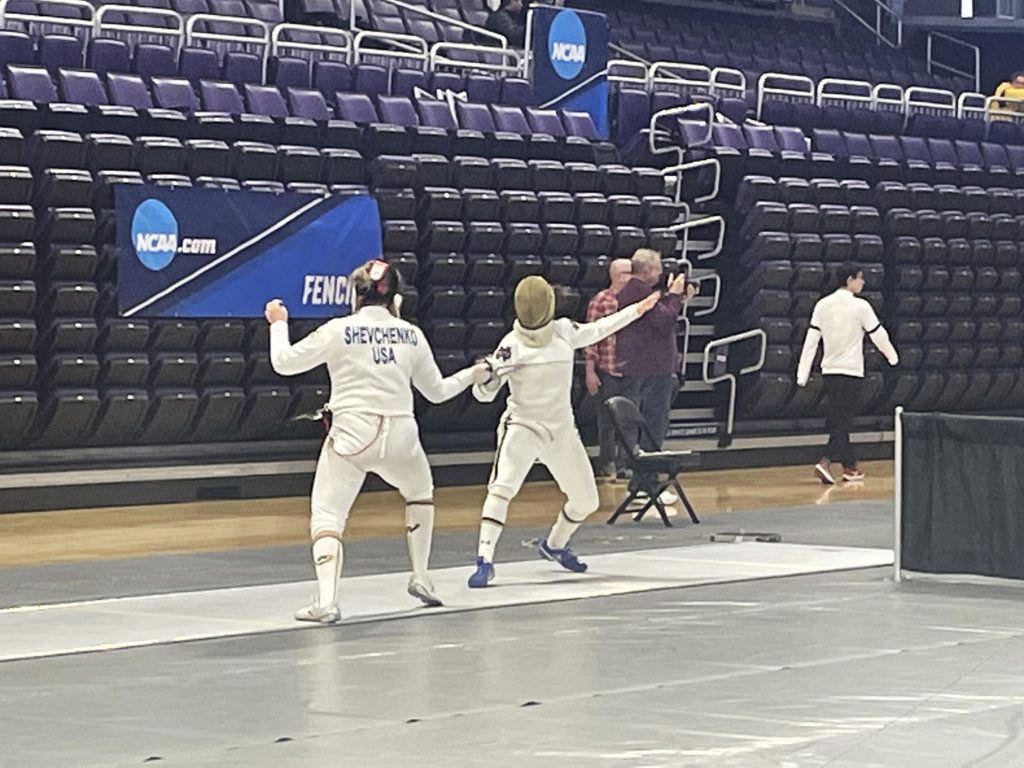By Patrick Z McGavin
EVANSTON—As a child of Japanese emigres growing up in Portland, Oregon, first-year Northwestern athlete Megumi Oishi had a natural flair for competition and sports.
The only issue was finding the one that best fit her personality and style.
The traditional sports flummoxed her.
“To be honest, I was not a very athletic kid at all,” she said. “I was bad at all the ball sports, and then my mom stuck me in the first sport that I showed interest in.
“I saw it in the Olympics, I saw it on television, and I just thought to myself that it was a really cool sport, and I started doing it in summer camp.”
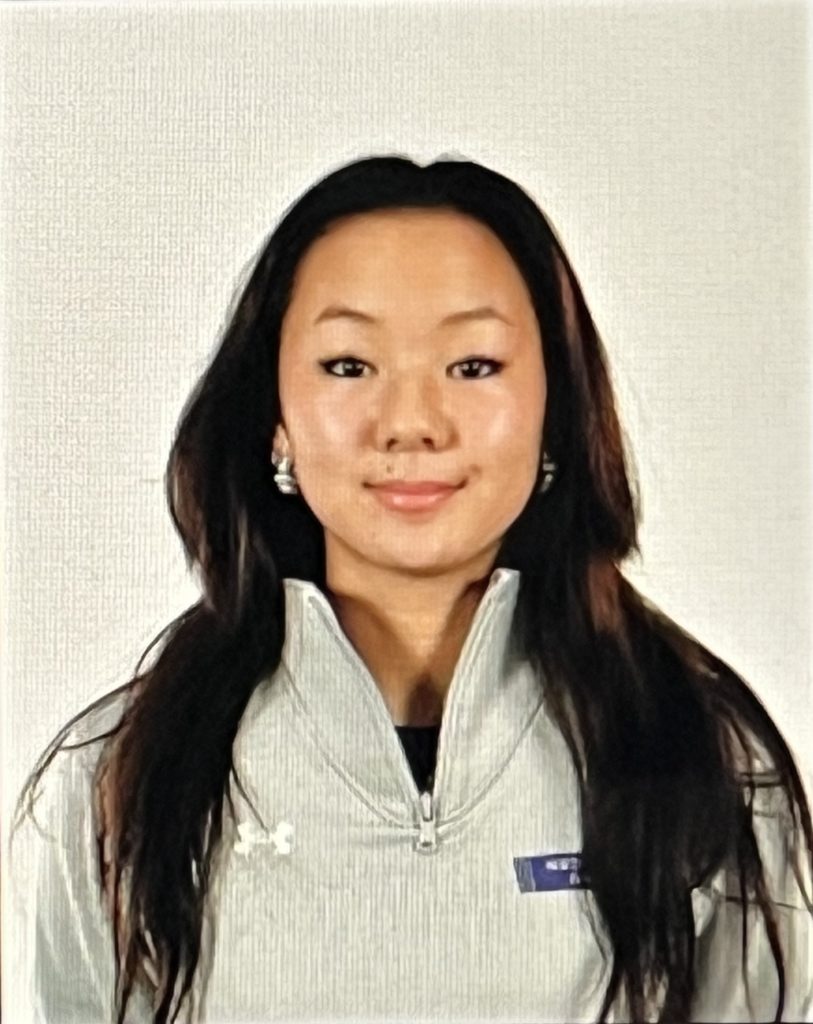
She was nine-years old. Now Oishi is one of the best in the country in her discipline, the saber, in the world of amateur fencing.
In the NCAA Midwest Regionals here Saturday, Oishi posted the best individual place for the host Wildcats with her third-place standing.
Notre Dame star Kara Linder, the 2021 national champion, captured first place in the saber as the Irish swept the three disciplines.
Fencing underscores the internationalization of the sport at the collegiate level. Northwestern has multiple foreign-born athletes on its men’s and women’s rosters, or like Oishi, first-generation Americans.
Fencing has three disciplines, or styles of blades: epee, foil, and saber.
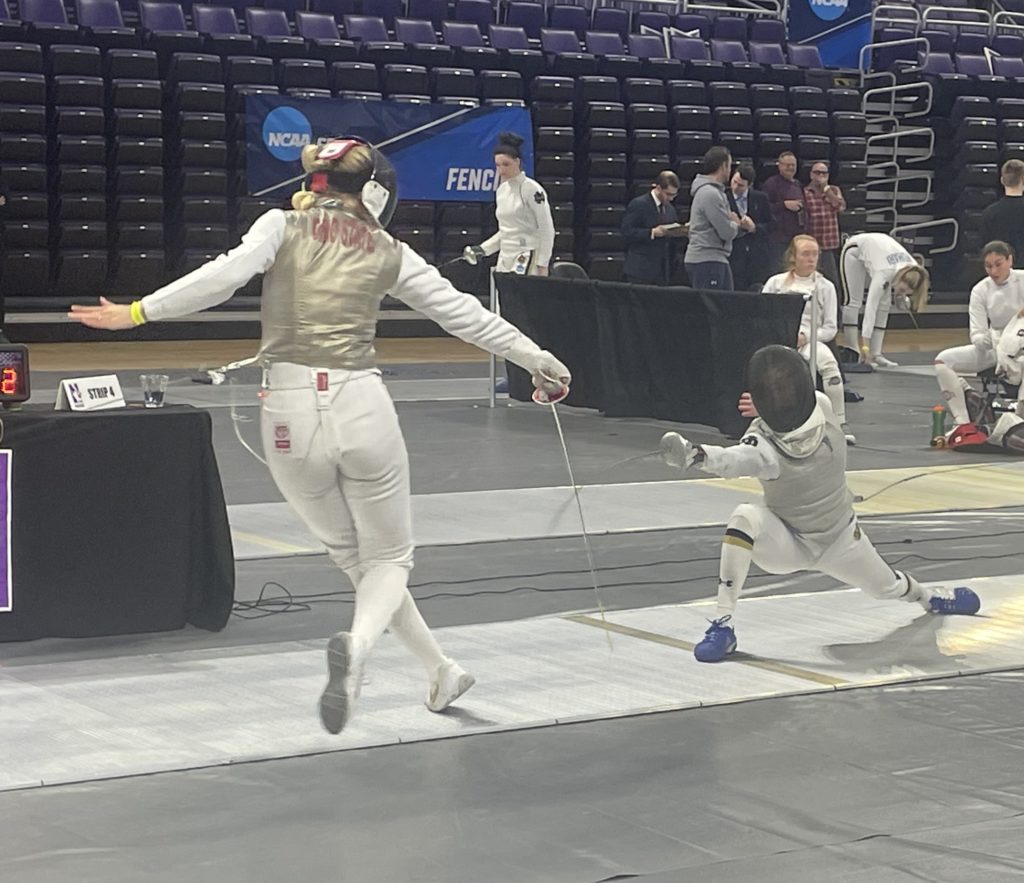

Notre Dame’s Eszter Muhari, who captured the epee title, was born in Romania, and now lives in suburban New Jersey. The individual champion of the foil, Notre Dame freshman Rebeca Candescu, is from Budapest, Hungary.
Fencing is an obsession in the central and Eastern European bloc, who have traditionally dominated the sport at the international and Olympic level.
Fencing is fast, propulsive and electric.
Unlike boxing or wrestling, comparable one-on-one sports played out in confined spaces, the sport has virtually no feeling out period.
The two combatants simply rush at each other. The first to five points wins, or the winner after the three minute time duration.
Fortune favors the bold.
“As a person, I have always been analytical,” Oishi said. “I tend to overthink things, and when there is no feeling out period, it forces me to be more spontaneous and a lot quicker on my feet.
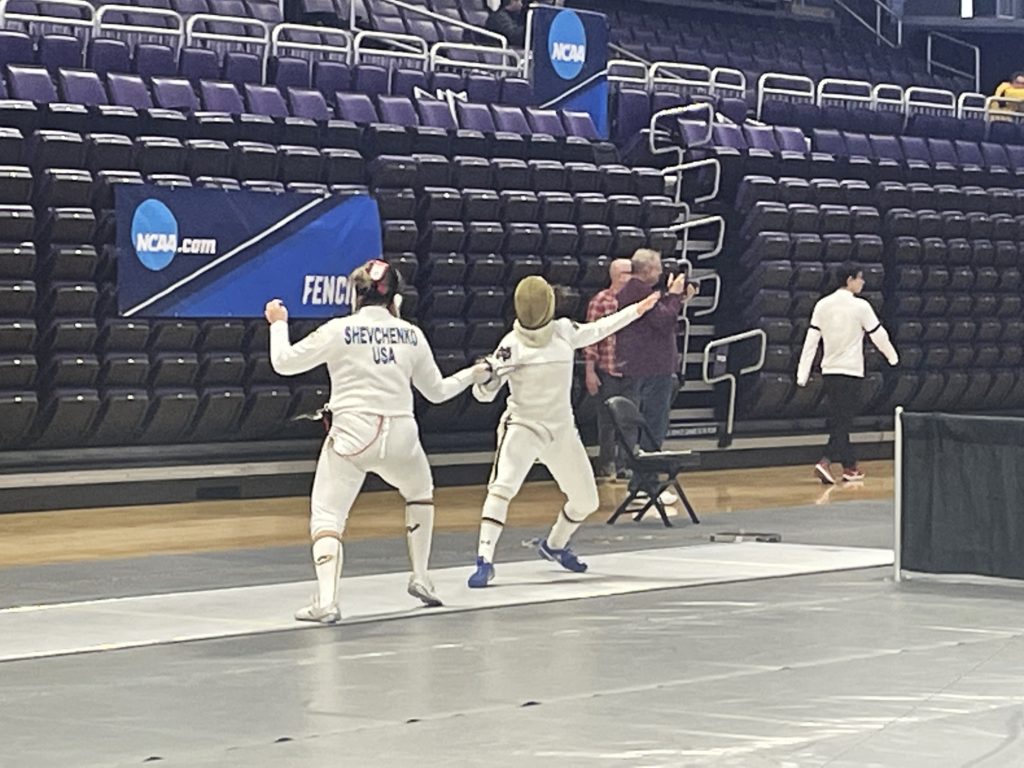

“I think that manifests in a lot more places in my life, and the sport is just a great opportunity to be able to think on my feet really quickly.”
Like boxing, fencing is a sport of contrasting styles and skilled personalities.
The sport is also like soccer, with its focus on balance, speed, anticipation and the ability to read the action. What makes an elite fencing performer is not always cut and dried, or hegemonic.
It is not a one size fit all sport.
“Fencing is a really cool sport, and I think there are so many different people who can fence it,” Oishi said.
“People who are more defensive can be very good, or people like me who are more offensive can also find success as well. I like being more diligent, and I also like being more analytical and adaptive in certain environments, so you can switch to different conditions.”
Zach Moss has been directing the women’s program at Northwestern for seven years.
Fencing is predicated on time and space, as the two combatants thrust at each other on the “strip,” the narrow and elongated band of space that separates the two athletes.
“It’s interesting, because there can be a feeling out period in the bout, it’s not very long,” Moss said.
“A lot of it is getting hit, and figuring out how to make adjustments to not getting hit.”
The differences of the epee, foil and saber are more pronounced than they appear, according to Moss.


“I don’t know that they are that subtle, the differences,” he said. “With the saber, you can hit with the side of the blade, which makes it very fast. They are running at each other, and there are a lot of changes.
“With foil and epee, you can hit with the tip, and it’s harder to score. With the saber, it’s from the waist up, and with the foil, it is only the torso, and the epee is full body head to toe.”
The epee, according to Moss, is more tactical and operational. Everything flows and moves a bit differently.
The fencer must act accordingly.
“It’s like soccer, where there’s a lot happening, but not a lot of scoring, because it’s whoever hits first, and everybody is very good at hitting very small targets.
“With the foil and saber, if I am coming at you with a sword, you are not going to just let yourself get hit. You are going to defend yourself. With those weapons, it tends to be a little bit faster paced.”
The Midwest regionals featured eight teams and twenty individuals in each discipline.
Muhari finished ahead of teammate Kaylin Hseih in the epee rankings.
Oishi was the top Wildcat place winner. In the final saber rankings, Northwestern’s Sky Miller was fourth and Kailing Sathyanath was eighth.
In the epee, Northwestern had four combatants: Karen Wang was the top finisher in fifth place, followed by Asha Henry, Hanna Lipthay, and Anna Damratoski.
Rowan Park was the best Wildcat finisher in the final foil rankings with her sixth place position.


Park, who grew up in suburban Los Angeles in Hermosa Beach, started the sport at the age of seven, following the path of her older sister.
“It was just kind of natural to get into after her,” Park said.
As a child she tried pretty much every sport imaginable, from basketball, volleyball and soccer.
Fencing had a cachet and appeal. It was unorthodox and cut against the grain.
The sport is quick and fast, and requires nerves.
“You need to give yourself like the first 30 seconds to build out, but after that you just need to decide,” Park said.
“I feel like the only time that is bad is when you don’t decide because then you get hit on random things. If you just make your decision, I think most of the time you are going to be confident.”
By her own admission, Park has an aggressive and fluent style. She is fast and nervy, and works to quickly gain the advantage.
“I just don’t think I want to be passive, and let the bout just happen with me,” she said.
“I like to make an action, and just try and figure it out myself, and just let things go.”
Linder gave a master class in the saber, and showed why she is the best in the country.
As a graduate student, she qualified for the nationals in two weeks in Durham, North Carolina.
She is a rare athlete, a five time national qualifier she was given an extra year of eligibility due to the pandemic.
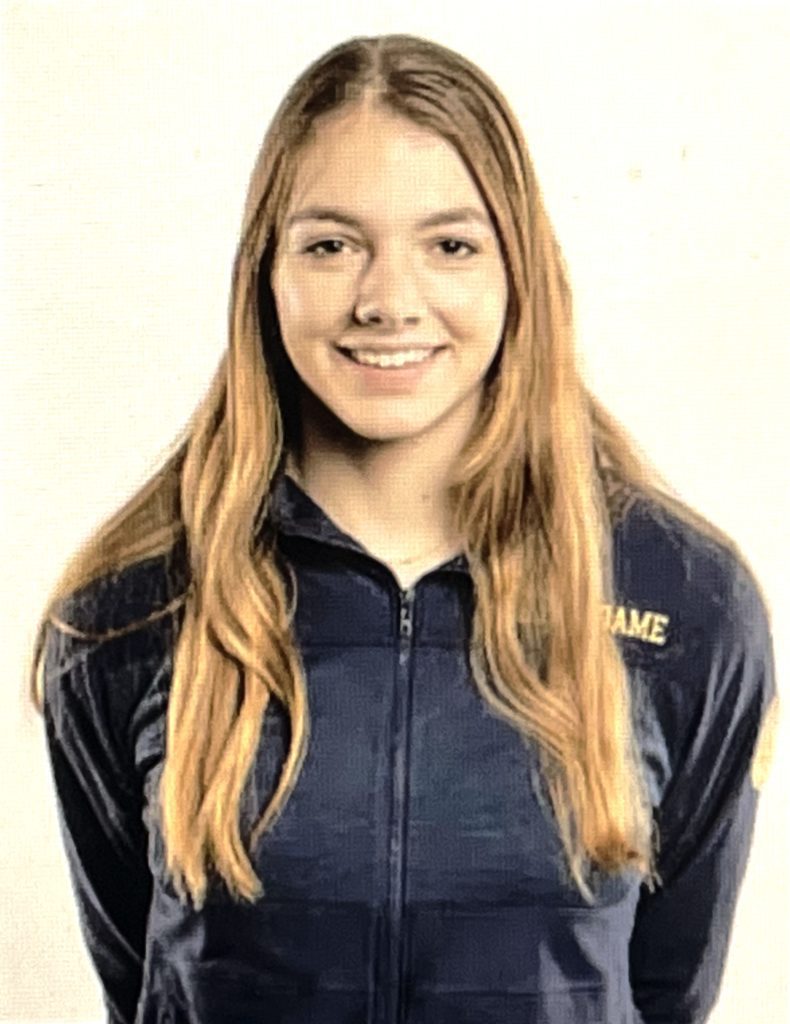

“My style is pretty aggressive,” Linder said. “A lot of it is based on my first two steps, and I have seen my style evolve and change over the years.
“Now I have become more tactile and been able to incorporate my physical ability into my tactics. Before it was all physical.”
Her younger brother Luke, as junior on the Notre Dame men’s team, played a crucial role in her introduction to the sport.
Growing up outside of Phoenix, the family was “Star Wars” obsessed. When the self styled Luke heard about the chance to play with swords, his eyes lit up.
His sister was a little more circumspect.
“I thought, we’ll see, but they told my parents it’s more economical if you both kids go to the club, and we just got more aggressive.”
Fencing is a niche sport, to be sure, but like lacrosse and other sports, it is fast growing, pushing outwards from hot spots like the East Coast, Los Angeles and Portland and moving in many different directions.
“Most of our recruitment happens at the national and international level,” Moss said.
“The governing body, USA Fencing, hosts competitions three or four times a year for the age group we are looking at for evaluation. We find them at nationals, and also the junior worlds.”
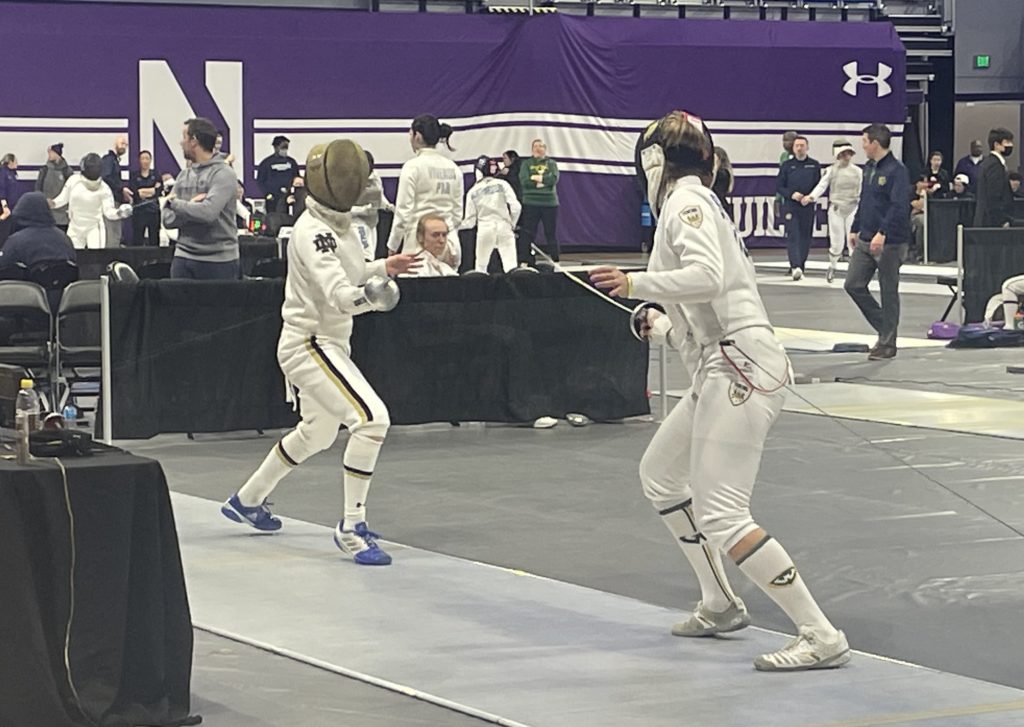

Winning is important and builds confidence, Oishi said.
The camaraderie and solidarity of the team pushes the sport to a new level.
“Celebrating with my team, even when there’s a loss, you are able to regroup and talk through it, and have that support,” she said.
“I think that is what gives you the most joy in terms of pure thrill.”

